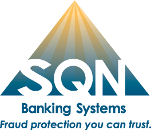 Every financial institution has anti-fraud safeguards in place, but how do you know if they are effective? A large attack is always lurking around the corner, and for peace of mind, you need to be sure that you’re well prepared. That’s why, in order to protect your financial institution and your customers, you must regularly review your anti-fraud systems.
Every financial institution has anti-fraud safeguards in place, but how do you know if they are effective? A large attack is always lurking around the corner, and for peace of mind, you need to be sure that you’re well prepared. That’s why, in order to protect your financial institution and your customers, you must regularly review your anti-fraud systems.
At SQN Banking Systems, we start most of our client relationships with a fraud process review. This gives us a chance to get to know your approach and your concerns. Then, we can customize our advice around your unique situation. To get help now, contact us today, or keep reading for a look at the questions you should consider.
What Is a Fraud Process Review?
A fraud process review helps you identify the most significant risks and uncover any control weaknesses. It determines what is working and where you can improve.
To ensure that anti-fraud systems and safeguards are effective, financial institutions should regularly conduct fraud process reviews. You should look at your fraud detection and prevention techniques, but you should also examine how your team collaborates. Remember, anti-fraud methods require top-to-bottom support to be effective. Your management team should recognize the need to fund anti-fraud solutions, while your front line must commit to following through on your processes.
An effective review will expose your deficiencies and assist you in determining the best next steps. It will also help you concentrate on removing redundancies and automating as much as feasible so that you can optimize your fraud budget and resources. You should also investigate where you might be upsetting customers due to practices that produce false positives.
5 Questions to Ask During a Fraud Process Review
In order to determine if you’re taking the best approach to preventing and fighting fraud, here are five questions to ask during a fraud process review.
1. Do You Educate Employees About the Importance of Anti-Fraud Programs?
Employee education on bank fraud prevention is critical — your employees are the first line of defense against fraudulent actions. They should have a solid awareness of common fraud schemes, red flags to look out for, and best practices for reporting suspicious actions.
Comprehensive training equips your staff with the ability to be attentive, proactive, and capable of deterring and detecting fraudulent behavior. Ideally, your staff should understand the risks of fraud facing your customers as well as the risks of attacks against the bank itself.
2. Is an Effective Fraud Reporting System in Place?
When your customers become the victim of fraud, can they reach you easily? Can they shut off their cards or stop payments on checks quickly, before a thief drains their account? If they report fraud that has already occurred, do you offer an easy-to-navigate reporting and refund request process for them?
You need to be able to answer yes to all of these questions. When a customer becomes a victim of fraud, they often blame the bank even if the breach was their fault. To maintain their business, you need to make this difficult time as easy as possible for them.
However, you also need an effective reporting process for internal fraud. Consider whether your fraud processes offer a safe and effective reporting system for employees. For example, a ‘whistleblowing’ policy and an easy way for employees to discreetly disclose any concerns about the behavior of other employees are critical components in combating staff fraud.
Additionally, in some cases, you may need to report fraud to law enforcement. To minimize misunderstandings, your policies should outline thresholds and practices for notifying legal authorities.
Some further questions to ask include the following:
- Have the staff been educated on how to express concerns about known or suspected wrongdoing?
- Is an anonymous reporting channel, such as a third-party hotline, available to employees?
- Do employees trust they can report suspicious behavior anonymously, privately, and without fear of repercussions?
- Does your staff understand that allegations of suspicious activity will be investigated swiftly and thoroughly?
- Do reporting policies and methods apply to vendors, customers, and other third parties?
3. Does the Process Leverage Machine Learning to Proactively Detect Fraud Patterns?
If you want to fight bank fraud effectively, you need to migrate away from legacy fraud solutions and toward solutions that leverage machine learning. Due to poor data quality, ineffective warnings, and non-existent or obsolete information, legacy fraud detection systems can’t keep up with the pace or volume of threats, especially as criminals develop new ways to attack companies.
In contrast, fraud prevention tools equipped with big-data analytics and machine learning constantly adapt to developing fraud patterns. Machine learning models change in response to new events and data, and they can offer new rules that continuously improve detection and prevention.
If your bank’s fraud solutions aren’t using machine learning, you are more susceptible to fraud. This puts you at risk of financial losses, but even worse, it threatens the relationships you have with your customers.
4. Does the Process Leverage a Wide Variety of Data?
A strong fraud prevention and detection solution relies on looking at the right data set for online, mobile, payment, and in-branch fraud. When evaluating your fraud-prevention process, consider your data collecting, integration, and analysis capabilities.
Ideally, you shouldn’t just collect data about financial transactions. Instead, you should look at a wide range of data related to every step of the customer journey. This allows you to detect account takeover and many other types of fraud before the funds leave your clients’ accounts.
5. Is There Adequate Separation of Job Duties?
Duty segregation is critical for detecting internal fraud or fraud facilitated between customers and employees. Do you rotate sensitive tasks such as currency handling? Do you require employees to take vacations?
Employees may identify security flaws before you do, and if they’re not ethical, they may exploit your flaws. No employee should be given excessive access to or responsibility for your bank’s assets. Sensitive tasks such as cash handling should be rotated among two or more staff to make it more difficult to hide unscrupulous actions.
To set up a fraud process review, contact us at SQN Banking Systems today. We offer a wide range of solutions to help your financial institution detect and prevent bank fraud.

